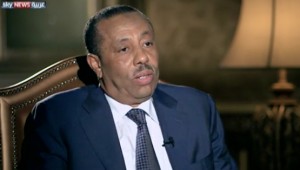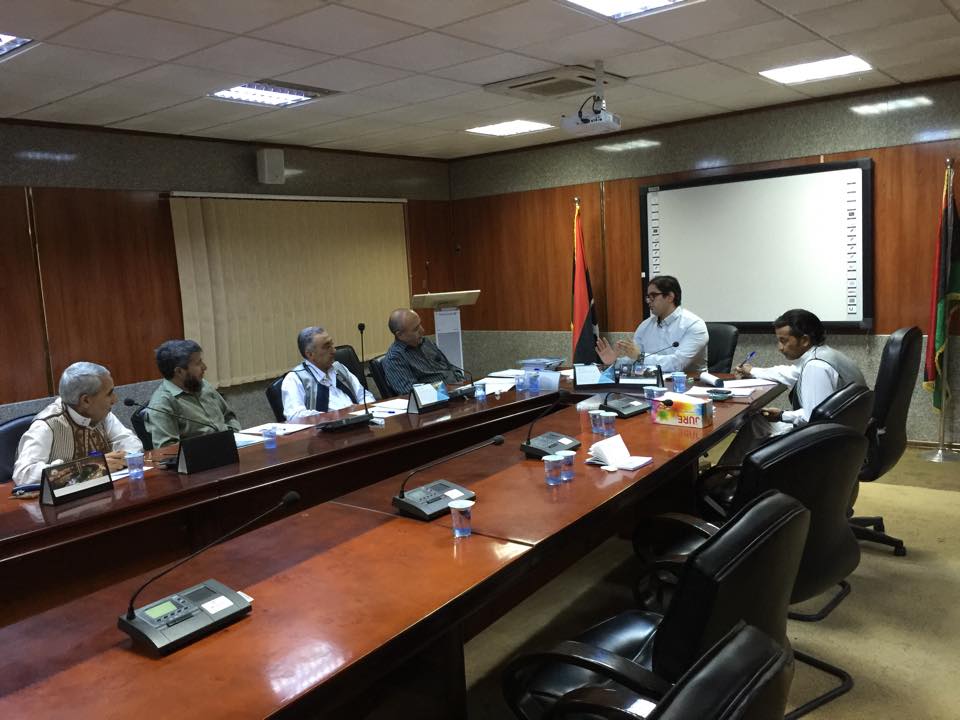By Libya Herald reporters.

Tripoli, 5 July 2015:
Prime minister Abdullah Thinni has warned that once a government of national unity is agreed . . .[restrict]an international force will be needed while the new administration builds up its police and army.
“If you work on the political agreement front alone then it will not achieve the objective” Thinni told Migrant Report and The Times of Malta, “The international community should keep a force in the country. The form can be agreed later on”.
Yet in the same interview Thinni vowed that his government would not accept EU action against migrant smugglers in Libyan waters. Picked up on the apparent contradiction he insisted the two issues were clearly different.
“If you are talking about a legitimate peace force agreed to by the government, that is one thing” he said. The size and presence of this force would be limited and its objectives and operations specified. This, he said was the opposite of allowing “the EU to enter national waters and do whatever they want without any objection by the Libyans”.
Thinni appeared to say that until the police and army had been built up, the international force might have to confront the militias, whose presence in Tripoli would threaten the new unity government which under the UNSMIL peace plan is due to be based there.
“The militias have to be removed so they cannot threaten the government again” he said.”If a national unity government is formed and it is coming back to Tripoli, it is incumbent on the UN and the international community to support this government and help it establish itself in Tripoli and discharge its duties from there. They should help in the removal of the militias from the capital. There is no realistic approach (as to) how this can be done right now but later on a plan will have to be devised on how to make this happen”.
Thinni was asked if he thought that militia leaders such as Salah Badi and Abdulrauf Kara in Tripoli might be “subdued”. He replied “These groups do not have any legitimacy, they are not part of the government or the army, they are operating outside of the law. They are considered to be gangs.
“If the international community is serious and transparent on how to deal with these names and other similar people, it will see to it that they face justice for war crimes before an international court. The groups will cease to exist and their leaders will face charges before the International Criminal Court”.
Thinni was challenged with the reality that many opposing the government considered General Khalifa Hafter a war criminal who should face charges.
“Reconciliation will be done with Libyans who have lesser crimes” he replied, “but leaders of groups who have committed crimes like attacking houses, installations, burning facilities that belong to the government or to citizens, should be held responsible for what they have done”
There would be no reconciliation with such people.
“So with this in mind,” he said, “a foreign peace-keeping force is crucial, especially until the Libyan government establishes itself”.
Thinni was predictably scathing of the General National Congress and moves to extend the UNSMIL dialogue along with its boycott of the latest round of talks in the Moroccan resort of Skirhat.
“We are used to these kinds of techniques from the GNC,” he said,”They are trying to get more concessions from the parliament side in order to make more political gains”. He cited demonstrations urging rejection of the newest draft agreement and demanding that UNSMIL chief Bernardino Leon be replaced.
“We are confident that eventually we will reach a solution and an agreement. But every part is trying to gain points in the process and we are sure that the GNC will keep trying hard to get the leading political role and not simply a role. They will give their consent at the very last minute, when things reach the very end”.
Thinni the GNC were playing for time until parliament’s mandate runs out in October. After that the country would be in a political vacuum with no legitimate parliament.
He believed however that the Constitution Drafting Assembly held the key. “We expect (it) to finish its work soon and surprise the Libyan people and the international community and they will have a solution that will avert this sort of vacuum”.
[/restrict]








